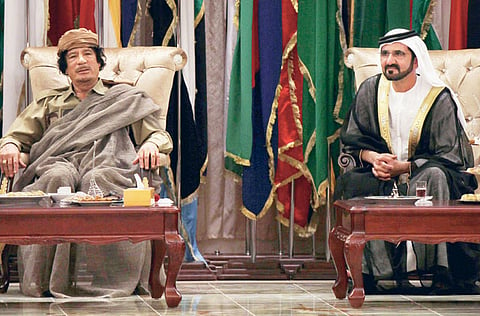Arabs allow one month for deal to save Mideast talks
US welcomes Arab League move to give more time for Middle East peace talks

Libya: Arab League foreign ministers threw their weight behind the Palestinian president's refusal to negotiate with Israel unless it renews restrictions on West Bank colony construction, but gave US mediators another month to keep peace talks from collapsing.
The grace period, agreed to Friday night at a meeting of the 22-member Arab bloc in Libya, gave the US some critical breathing room but also came with a warning to Israel of the dangerous consequences should it refuse to compromise.
Washington welcomed the outcome and pledged to forge ahead with efforts to keep both sides at the table in talks that began just over a month ago.
They are the first direct Middle East peace talks in nearly two years, but they quickly faced a huge hurdle with the expiration of a 10-month Israeli moratorium on new construction in West Bank colonies.
Israel has refused to extend the curbs, though it is considering compromises.
The Palestinians have said they won't return to the talks until the restrictions are again in place, arguing that any negotiations aimed at a two-state solution are pointless as long as Israel is building on land claimed by the Palestinians.
"We support the Palestinian president's position calling for a complete halt of all settlement activities in order to resume negotiation," the Arab League's deputy secretary general, Ahmad Bin Helli, said as he read a statement issued after the ministerial meeting.
However, the ministers also said they would resume meetings in a month to study alternatives and decide on next steps, giving the United States extra time.
The chief Palestinian negotiator in the peace talks, Saab Erekat, sought to keep the pressure on Israel.
"The Israeli government was given the choice between peace and settlements, and it has chosen settlements," Erekat said. "It (Israel) alone bears the responsibility for this."
The Israeli government had no immediate comment on the Arab League statement.
Israeli Prime Minister Benjamin Netanyahu has refused to renew the construction curbs for fear of angering his hard-line coalition partners and reneging on his own explicit promises that the slowdown was a one-time gesture and would last only 10 months.
Officials in Washington said the Arab League has made clear its support for continued US efforts to create the conditions necessary for keeping the negotiations going.
"We appreciate the Arab League's statement of support for our efforts to create conditions that will allow direct talks to move forward," said State Department spokesman P.J. Crowley. "We will continue to work with the parties, and all our international partners, to advance negotiations toward a two-state solution and encourage the parties to take constructive actions toward that end."
Delegates at Friday's meeting said the ministers made their decision after Palestinian leader Abbas explained that he faced stiff opposition to returning to the peace talks in the Palestinian territories.
They also said some of Friday's discussions centered on the need to delay a final decision until US congressional elections in early November so the Obama administration would not face as much political pressure.
Secretary of State Hillary Rodham Clinton and special Mideast envoy George Mitchell called Arab leaders throughout the week, urging them to persuade the Palestinians not to walk away from the talks.
Friday's statement came despite a proposal by moderate Arab nations led by Egypt and Jordan for Abbas to return to indirect talks.
Some hard-line Arab states, including Syria, opposed any attempt to go back to the talks.
"I cannot see any benefit from this meeting," said Syrian Foreign Minister Walid Al Muallem, who stayed away from the meeting and sent instead Syria's envoy to the Arab League.
Lebanon boycotted the discussions altogether because of a dispute with Libya.



